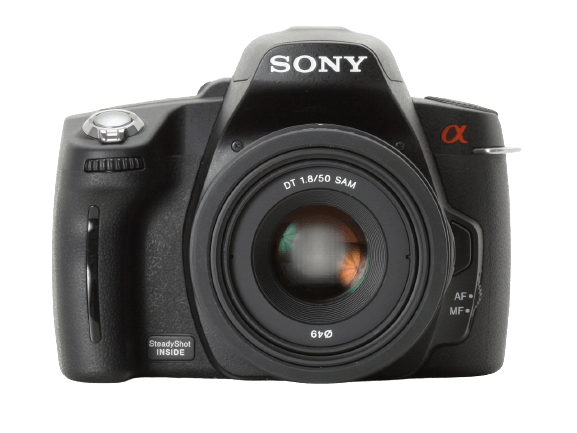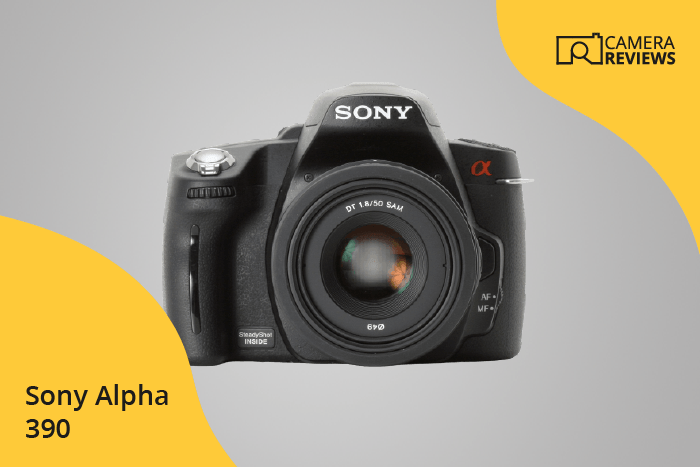Sony Alpha 390 Specs and Scores

The Sony Alpha 390 scores a 40 out of 100 on our scale. Announced on June 9th, 2010, and released the same year, this DSLR carries a launch price of $620. With dimensions of 128 x 97 x 86mm and a weight of 549g (1.21lbs), it is a relatively compact and lightweight camera.
Considering the camera’s specifications and age, it struggles to compete with more modern DSLR cameras in the market. Nevertheless, the Sony Alpha 390 remains a decent option for those seeking an affordable, entry-level DSLR.
Sony Alpha 390 Overview and Optics
The optics of the Sony Alpha 390 receive a score of 46/100. This camera features 14.2 megapixels and a shooting speed of 2.5 frames per second. It is equipped with a CCD sensor and a Bionz processor. The DXOMARK score for the sensor is 66, and it has an APS-C sensor size. The lens mount is Sony Alpha DT, and it includes image stabilization. The aspect ratio is 3:2.
Compared to current market standards, the Sony Alpha 390 falls short in some aspects. The 14.2-megapixel resolution is lower than many modern cameras, and the shooting speed of 2.5 frames per second is also slower than competitors. However, the image stabilization feature is a valuable addition that helps improve image quality.
The Sony Alpha 390’s optics are not the most advanced or competitive in today’s market. Despite its limitations, the camera still offers some useful features, such as image stabilization. It may not be the top choice for professionals, but it can be a suitable option for those seeking a basic, reliable camera.
Sony Alpha 390 Video Performance
The Sony Alpha 390 lacks video capabilities. This camera solely captures still images.
Sony Alpha 390 Features and Benefits
The Sony Alpha 390 earned a feature score of 34/100. The camera possesses a 2.7-inch screen with a resolution of 230,400 dots. It does not have a touchscreen, but it does have a flip screen for various shooting angles. Unfortunately, the Alpha 390 lacks modern connectivity features, such as GPS, WiFi, and Bluetooth.
Comparing these specifications to today’s market, the Alpha 390 falls behind in terms of screen size, resolution, and connectivity. Many current cameras offer touchscreens, higher resolutions, and various connectivity options. The absence of these features limits the versatility and functionality of the Alpha 390.
The Sony Alpha 390 is an entry-level camera with basic features. Its low feature score highlights its limitations when compared to other cameras in the market. Potential buyers should consider these factors before making a decision.
Sony Alpha 390 Storage and Battery
The storage and battery score for the Sony Alpha 390 is a mere 13/100. The camera has only one memory card slot, accepting SD/SDHC and Memory Stick Pro Duo/Pro-HG Duo cards. This limitation may hinder photographers who require more storage capacity or the flexibility of multiple card slots.
The Sony Alpha 390’s battery life is also quite low, providing just 230 shots per charge with its NP-FH50 battery. Furthermore, the camera lacks USB charging capabilities. In comparison to modern cameras, this battery life is considered subpar, as many contemporary models offer longer-lasting batteries and convenient USB charging options.
Considering the storage and battery specifications of the Sony Alpha 390, it falls short in meeting the expectations of today’s market. Its limited storage options and inadequate battery life make it a less desirable choice for photographers in need of a reliable and versatile camera.
Sony Alpha 390 Alternatives
Do you want to know how the Sony Alpha 390 compares to its competitors? Have a look at the most popular comparisons for this camera below:
- Canon EOS 40D vs Sony Alpha 390
- Sony Alpha 390 vs SLT Alpha 58
- Canon EOS 50D vs Sony Alpha 390
- Canon EOS Rebel T3 / 1100D vs Sony Alpha 390
- Canon EOS Rebel T7i / 800D vs Sony Alpha 390
- Canon EOS Rebel XS / 1000D vs Sony Alpha 390
Sony Alpha 390 FAQ
Does the Sony Alpha 390 Have Built-in Image Stabilization?
Yes, the Sony Alpha 390 features built-in image stabilization, which helps reduce camera shake and improve image sharpness in various shooting conditions.
Does the Sony Alpha 390 Support 4K Video Recording?
The Sony Alpha 390 does not support 4K video recording as it does not have video functionality, making it suitable for still photography only.
What Size Sensor Does The Sony Alpha 390 Have?
The Sony Alpha 390 is equipped with an APS-C sized sensor, which is a popular choice for many DSLR cameras due to its balance between image quality and camera size.
Does the Sony Alpha 390 Have a Dual Memory Card Slot?
No, the Sony Alpha 390 features a single memory card slot, which means you can only use one memory card at a time for storing your photos.
Does the Sony Alpha 390 Have a Touch Screen?
No, the Sony Alpha 390 does not have a touch screen, which means you’ll need to use the physical buttons and dials to navigate the camera’s settings and menus.
Does the Sony Alpha 390 Have Wi-Fi and Bluetooth?
The Sony Alpha 390 does not have built-in Wi-Fi or Bluetooth connectivity, which means you cannot wirelessly transfer photos or control the camera remotely through a smartphone or tablet.
Does the Sony Alpha 390 Have GPS?
No, the Sony Alpha 390 does not have built-in GPS functionality, so you will need to manually add location information to your photos if desired.
Is the Sony Alpha 390 Weather Sealed?
No, the Sony Alpha 390 is not weather-sealed, which means it is not designed to withstand harsh weather conditions or exposure to dust and moisture.
Does the Sony Alpha 390 Have a Built-in Flash?
Yes, the Sony Alpha 390 has a built-in flash, which can be useful for providing additional light in low-light situations or for creating fill light in certain shooting scenarios.

